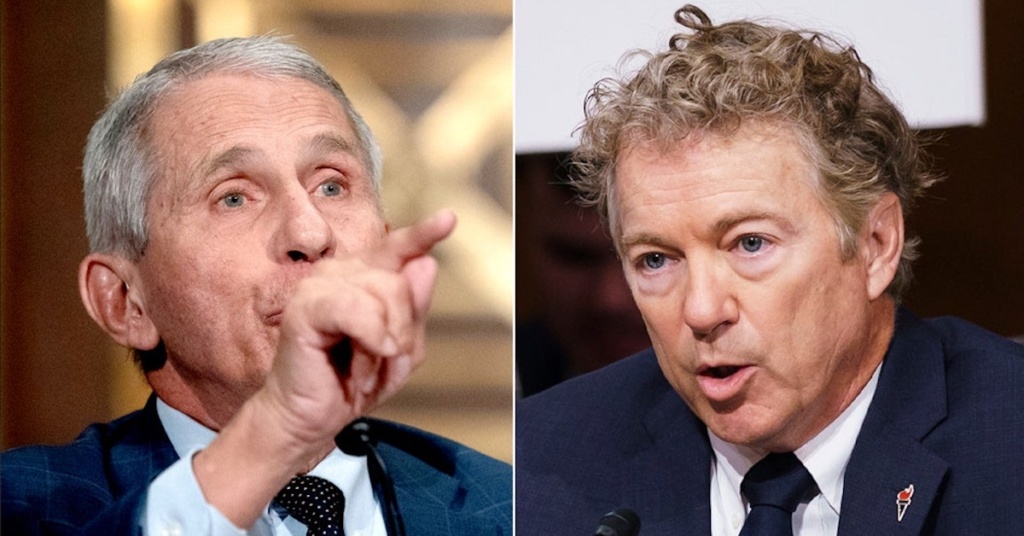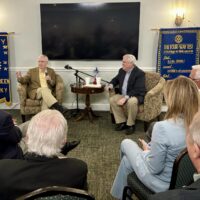The long-running acrimony between U.S. Sen. Rand Paul and Dr. Anthony Fauci, head of the National Institute of Allergy and Infectious Diseases, escalated Tuesday, as Paul strongly implied that Fauci had lied to Congress, and Fauci told Paul that if anyone was lying it was him and “You do not know what you are talking about.”
The battleground was, as usual, a Senate committee hearing. “In his questioning of Fauci, Paul stepped close to the line of accusing Fauci of lying to Congress in previous testimony in which he said that the NIAID had never funded gain-of-function research in China,” reports Tyler Olson of Fox News.
- RELATED: Al Cross: Rand Paul trends more eccentric, leaving room in the middle
- RELATED: Rand Paul says he is not concerned about a Charles Booker challenge
Gain-of-function research can lead to pathogens becoming stronger. “Citing a paper on research about bat coronaviruses, Paul said that U.S. money had essentially gone to the hazardous and controversial research – an assertion Fauci strongly objected to,” Olson reports.
“Fauci had denied that the health institute ever funded gain-of-function research at a Wuhan lab,” the Lexington Herald-Leader reports. Paul asked Fauci, “Knowing that it is a crime to lie to Congress, do you wish to retract your statement of May 11, where you stated that NIH never funded gain-of-function research in Wuhan?”
Fauci replied, “I have never lied before the Congress, and I do not retract that statement.”
Paul “continued to press Fauci, making claims that the viral studies being done were gain-of-function, which Fauci again denied,” the Herald-Leader reports.
Fauci, clearly angered, said, “Senator Paul, you do not know what you are talking about, quite frankly, and I want to say that officially. You do not know what you are talking about.”

The Herald-Leader reports, “The two proceeded to talk over each other until Paul’s speaking time expired, at which point he said Fauci ‘won’t admit the truth’.” Fauci replied, “You are implying that what we did was responsible for the deaths of individuals. I totally resent that, and if anybody’s lying here, senator, it is you.”
“Paul replied by saying the health institute’s actions ‘could have been’ responsible for deaths,” the Herald-Leader reports. “Fauci said there was a ‘pattern’ of Paul trying to argue with Fauci ‘based on no reality’.
Paul’s allegation was not new, but attention remains focused on the Wuhan lab because the Chinese government has not permitted a full investigation of it as a possible source of the virus. Last week, CNN reported, “Senior Biden administration officials overseeing an intelligence review into the origins of the coronavirus now believe the theory that the virus accidentally escaped from a lab in Wuhan is at least as credible as the possibility that it emerged naturally in the wild — a dramatic shift from a year ago, when Democrats publicly downplayed the so-called lab leak theory.”
Paul, an ophthalmologist, told Fauci, “We don’t know that it did come from the lab, but all the evidence is pointing that it came from the lab, and there will be responsibility for those who funded the lab, including yourself.”
Fauci replied, “I totally resent the lie that you are now propagating, senator, because if you look at the viruses that were used in the experiments that were given in the annual reports that were published in the literature, it is molecularly impossible” for those viruses to result in the coronavirus.
A week after the May faceoff, fact checker Glenn Kessler of The Washington Post wrote, “There is some smoke here, but we do not yet perceive the fire claimed by Paul. To some extent, all money is fungible. But the … funding was not related to the experiments, but the collection of samples. The NIH grant includes language that some say suggests gain-of-function research; NIH says that is a misinterpretation. Paul’s statements about [Dr. Ralph] Baric’s research [with Chinese collaborators] also appear overblown. We wavered between Two and Three Pinocchios, but decided on Two, because there still are enough questions about the work at the Wuhan lab to warrant further scrutiny, even if the NIH connection to possible gain-of-function research appears so far to be elusive.”
On Kessler’s four-Pinocchio rating scale, two means “Significant omissions and/or exaggerations. Some factual error may be involved but not necessarily. A politician can create a false, misleading impression by playing with words and using legalistic language that means little to ordinary people.”
Al Cross is professor emeritus of journalism at the University of Kentucky. He was the longest-serving political writer for the Louisville Courier Journal (1989-2004) and national president of the Society of Professional Journalists in 2001-02. He joined the Kentucky Journalism Hall of Fame in 2010. The NKyTribune is the home for his commentary which is also offered to other publications.






